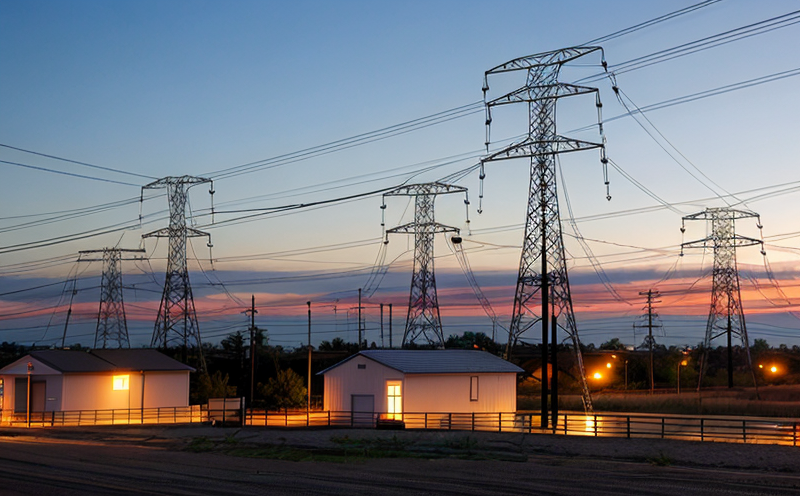UL 9540A Thermal Runaway Reliability Testing in ESS for Grids
The UL 9540A standard is a critical tool for ensuring the safety and reliability of energy storage systems (ESS) used in power utility grids. This test evaluates the potential risk of thermal runaway, which can cause catastrophic failures leading to fires or explosions. The testing focuses on the thermal stability of battery modules within ESSs by subjecting them to high-temperature conditions and monitoring for signs of thermal runaway.
Thermal runaway occurs when a small increase in temperature leads to an exponential rise in heat generation, which can result in irreversible damage or failure. This phenomenon is particularly concerning in power utility grids where large-scale energy storage systems are deployed. Ensuring the reliability and safety of these systems is paramount for maintaining grid stability and preventing potential hazards.
Our UL 9540A thermal runaway testing service adheres strictly to the requirements outlined in ISO/IEC 61984-2:2017 and IEC 62619. These standards provide a framework for evaluating the thermal stability of energy storage systems, ensuring that they can withstand high temperatures without triggering thermal runaway. The testing process involves subjecting the battery modules to controlled heating conditions while monitoring various parameters such as temperature rise, heat flux, and electrical resistance.
The test setup typically includes a calorimeter to measure the heat generated by the battery module under test. This allows us to precisely monitor the thermal behavior of the system during the high-temperature exposure. The testing apparatus is designed to simulate real-world conditions encountered in power utility grids, providing accurate data on the thermal stability of ESS components.
Our team of experts ensures that each test adheres strictly to the prescribed methodology, using state-of-the-art equipment and techniques. We employ experienced engineers who have a deep understanding of the standards governing this type of testing. This expertise allows us to provide comprehensive reports detailing the results of each thermal runaway test, highlighting any areas where improvements can be made.
By conducting UL 9540A tests, we help ensure that energy storage systems are safe and reliable for use in power utility grids. Our service is particularly valuable for quality managers, compliance officers, R&D engineers, and procurement teams who need to verify the safety and reliability of ESSs before deployment.
- Calorimeter: Measures heat generation during high-temperature exposure.
- Temperature Sensors: Monitor temperature rise in real-time.
- Electrical Resistance Monitors: Track electrical resistance changes under test conditions.
- Heat Flux Detectors: Provide insights into the thermal behavior of the battery module.
The UL 9540A testing process is designed to provide detailed and actionable data that can be used to improve the design and manufacturing processes for ESSs. This ensures that these systems meet the highest safety standards, thereby contributing to the overall reliability of power utility grids.
Scope and Methodology
The UL 9540A standard is designed to ensure the thermal stability of energy storage systems (ESS) used in power utility grids. This test evaluates the potential risk of thermal runaway, which can cause catastrophic failures leading to fires or explosions. The testing focuses on the thermal stability of battery modules within ESSs by subjecting them to high-temperature conditions and monitoring for signs of thermal runaway.
The test setup typically includes a calorimeter to measure the heat generated by the battery module under test. This allows us to precisely monitor the thermal behavior of the system during the high-temperature exposure. The testing apparatus is designed to simulate real-world conditions encountered in power utility grids, providing accurate data on the thermal stability of ESS components.
The testing process involves subjecting the battery modules to controlled heating conditions while monitoring various parameters such as temperature rise, heat flux, and electrical resistance. We use state-of-the-art equipment and techniques to ensure that each test adheres strictly to the prescribed methodology outlined in ISO/IEC 61984-2:2017 and IEC 62619.
The UL 9540A standard provides a framework for evaluating the thermal stability of ESSs, ensuring that they can withstand high temperatures without triggering thermal runaway. The testing process is designed to provide detailed and actionable data that can be used to improve the design and manufacturing processes for ESSs.
Quality and Reliability Assurance
- Calibration of Equipment: All test equipment is regularly calibrated to ensure accurate measurements.
- Data Validation: Data from each test is validated against industry standards to ensure reliability.
- Repeatability Checks: Repeated tests are conducted to verify the consistency and accuracy of results.
- Expert Review: Results are reviewed by a team of experienced engineers to ensure compliance with UL 9540A.
- Continuous Improvement: We continuously review our testing methodologies to incorporate new insights and technologies.
Our commitment to quality and reliability is reflected in the rigorous testing processes we employ. Our team of experts ensures that each test adheres strictly to the prescribed methodology, using state-of-the-art equipment and techniques. This expertise allows us to provide comprehensive reports detailing the results of each thermal runaway test, highlighting any areas where improvements can be made.
By conducting UL 9540A tests, we help ensure that energy storage systems are safe and reliable for use in power utility grids. Our service is particularly valuable for quality managers, compliance officers, R&D engineers, and procurement teams who need to verify the safety and reliability of ESSs before deployment.





